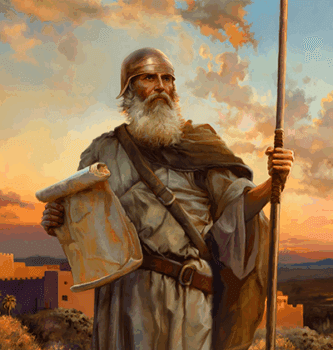Key Thought:The land is important in the beginning with the promise to Israel and in the end when the meek shall inherit the earth. But to rest in the land is only through Jesus and spiritual rest.
November 29, 2025
1. Have a volunteer read Exodus 3:8, Leviticus 20:22, 25:23, Numbers 13:27.
- Ask class members to share a short thought on what the most important point is in this passage.

- What was the special relationship between God, Israel, and the Promised Land?
- Personal Application: What do you think it means to Christians to be heirs of the promise? Share your thoughts.
- Case Study: One of your relatives states, “What is the relationship of a country and how you live your life within that country? How does one affect the other? How does this show what expectations and requirements are important for Christians to enter the Promised Land?” How would you respond to your relative?
2. Have a volunteer read Joshua 13:1-7.
- Ask class members to share a thought on what the most important point in this text is.
- What were some of the challenges Israel had in possessing the land God had promised them?
- Personal Application: How do Christians today encounter similar challenges related to occupying the Promised Land?
- Case Study: One of your friends states, “I’ve been promised many things in my life, but not many of the promises were kept. Promises given, promises broken. Why should I trust God and His promises? How do I know He will keep His promises? How do I know the promises apply to me personally?.” How would you respond to your friend?
3. Have a volunteer read Leviticus 25:1-5, 8-13.
- Ask class members to share a short thought on what the most important point in this text is.
- What is the purpose of the Sabbatical year and the year of Jubilee?
- Personal Application: What can the principle of the land statement remind us that we are all equal in God’s eyes? Share your thoughts.
- Case Study: One of your neighbors states: “What is your application of this principle to how we treat refugees from dictatorial, war-torn, or impoverished countries? Is it okay for them to seek relief by breaking the laws of the land they are entering?” How would you respond to your neighbor?
4. Have a volunteer read Jeremiah 24:6, 31:16, Ezekiel 11:17, 28:25, 57:14,25.
- Ask class members to share a thought on what the most important point in this text is.
- What was the promise of God concerning the return of Israel to the Promised Land, and how was it fulfilled?
- Personal Application: What hope is found for Christians that God has promised and the death of Jesus has guaranteed? Share your thoughts.
- Case Study: Think of one person who needs to hear a message from this week’s lesson. Tell the class what you plan to do this week to share with them.
(Truth that is not lived, that is not imparted, loses its life-giving power, its healing virtue. Its blessings can be retained only as it is shared. ”Ministry of Healing, p. 148).
 (0)
(0)
 LESSONS OF FAITH FROM JOSHUA
LESSONS OF FAITH FROM JOSHUA Lesson 9 : Heirs of the Promise, Prisoners of Hope
Lesson 9 : Heirs of the Promise, Prisoners of Hope 9.2 The Land as a Gift
9.2 The Land as a Gift Living in Covenant with God
Living in Covenant with God Introduction
Introduction Bible Study
Bible Study 1. The Promised Land as a Gift from God – Not a Property Right
1. The Promised Land as a Gift from God – Not a Property Right Exodus 3:8
Exodus 3:8 Answers to the Questions
Answers to the Questions Answer:
Answer: Application for Daily Life
Application for Daily Life Conclusion
Conclusion Thought of the Day
Thought of the Day Illustration
Illustration  Chapter 1: The Border
Chapter 1: The Border 24 November 2025
24 November 2025 BELIEVE HIS PROPHETS
BELIEVE HIS PROPHETS Daily Bible Reading
Daily Bible Reading Judges 11 – Judge, Outsider, and the Tragedy of His Vow
Judges 11 – Judge, Outsider, and the Tragedy of His Vow Between Calling, Deliverance, and Bitter Consequences
Between Calling, Deliverance, and Bitter Consequences Read online
Read online  Introduction
Introduction Commentary
Commentary Summary
Summary Message for Us Today
Message for Us Today Reflection Prompt
Reflection Prompt
 23 – 26 November 2025
23 – 26 November 2025 Ellen White | Patriarchs and Prophets – Chapter 43
Ellen White | Patriarchs and Prophets – Chapter 43 The Death of Moses | Justice, grace, and hope beyond the grave
The Death of Moses | Justice, grace, and hope beyond the grave BLOG 2 – The Final Ascent
BLOG 2 – The Final Ascent The Road to Nebo – A Quiet Farewell
The Road to Nebo – A Quiet Farewell November 24, 2025
November 24, 2025 Joseph – Faith That Carries You Through
Joseph – Faith That Carries You Through 27. The Reward of Patience
27. The Reward of Patience Daily Bible Verse
Daily Bible Verse Introduction
Introduction Devotion
Devotion Thoughts for Your Heart
Thoughts for Your Heart What We Can Learn from Joseph
What We Can Learn from Joseph Practical Steps
Practical Steps Questions for Reflection
Questions for Reflection Prayer
Prayer Key Thought of the Day
Key Thought of the Day Blessing to Close
Blessing to Close
